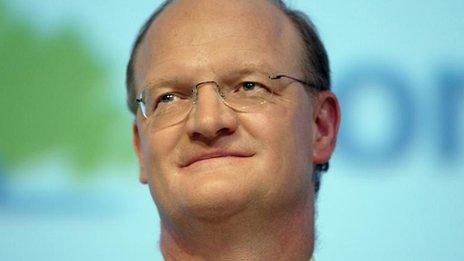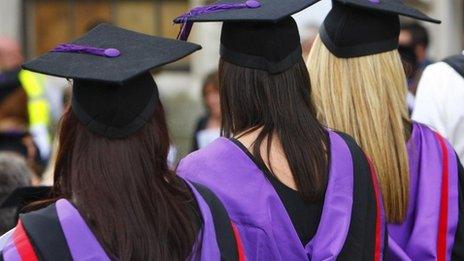Degree courses 'not value for money', say many students
- Published

Students in England pay tuition fees of up to £9,000 a year
A third of students in England, who pay up to £9,000 in tuition fees, say their degree course is poor or very poor value for money, a study indicates.
A survey of 15,046 UK students found they have just 10 minutes extra with university lecturers despite the rise - for the majority - in fees since 2012.
The findings are revealed by the Higher Education Policy Institute (Hepi) and the Higher Education Academy (HEA).
The government said students, "quite rightly", had higher expectations.
Higher tuition fees in England mean undergraduates currently in the first or second year of university study are paying up to £9,000 a year.
The Hepi and HEA research found today's students in England were more likely to say their course was poor value compared to 2012 - before the fee hike.
One third of current first- and second-year students (33%) said they were receiving poor or very poor value for money, compared with 18% in 2012.
And just 36% of these students thought their course represented good value for money, compared with 52% in 2012.
But the study found students in Scotland were more likely to say their course was worth the money, with 70% of those at Scottish universities rating their course as good or very value.
However, Scottish students pay no tuition fees, if they study at a university in Scotland.
The Hepi/HEA report says regional differences in perceptions of value for money are "not unexpected given that Scottish and other EU-domiciled students from outside the UK, who constitute the vast majority of students at Scottish institutions, effectively pay no fees".
'Contact' time
When asked what their top three priorities would be for institutional expenditure, 48% of UK students polled said "reducing fee levels", followed by having more teaching hours and reducing the size of teaching groups (both 35%).

The survey questioned 15,046 students about how they viewed their courses
The survey also found 31% said they would definitely or maybe have chosen another course if they were to have their time again.
The survey found that in the first and second years of their degree, undergraduates have an average of 14.2 hours of "contact" time - for example time spent in lectures and seminars, and spend another 14.3 hours on average in private study.
This is much less than the 40 hours a week of study suggested in the Quality Assurance Agency's (QAA) guidelines, the report said.
The findings show students do not attend about 9% of lectures and seminars laid on by their university, with the most common reasons for absence being that undergraduates did not find the lectures very useful and that the notes were available online.
Universities minister David Willetts said: "Young people are more serious about their education than ever before. Universities need to raise their game [...] I don't think universities are worse, but students have higher expectations, quite rightly."

Universities minister David Willetts says institutions will need to raise their game
Mr Willetts said institutions would now have to do "far better" than simply offering lectures with 500 students sitting in a room taking notes from slides on a screen.
He added: "The days where the academic experience is simply sitting in rows with 500 other people taking notes from slides on a screen that you can access online on your laptop, universities now have to do far better than that."
Elections
Nick Hillman, director of Hepi, said: "The data suggest growing differences across the UK. Students in Scotland generally think they are getting good value for money.
"Meanwhile, students in England are paying much more but receiving only a little more. In England, one in three students say they are getting poor value for money - nearly twice as high as before the £9,000 fees were introduced.
"In this election year, students should press all the political parties to say what they will do to encourage universities to offer world-class teaching alongside their world-class research."
Nicola Dandridge, chief executive of Universities UK, said: "The increase in fees in England and the shift away from public funding to higher graduate contributions means that students are clearly demanding more from their courses.
"The important thing is ensuring that students have enough information about their courses and that the experience matches their expectations.
"Due to the quality of its degrees, the UK has one the strongest and most highly respected higher education systems in the world."
Sonia Sodha, head of public services policy at the consumer magazine Which?, said: "A key problem is a lack of information that makes it difficult for students to make a fully informed choice. We want better data to be included in the key information set such as the amount and type of scheduled teaching."
- Published10 April 2014

- Published10 April 2014

- Published24 April 2014
